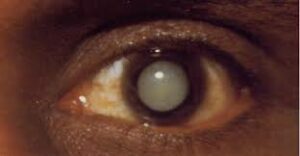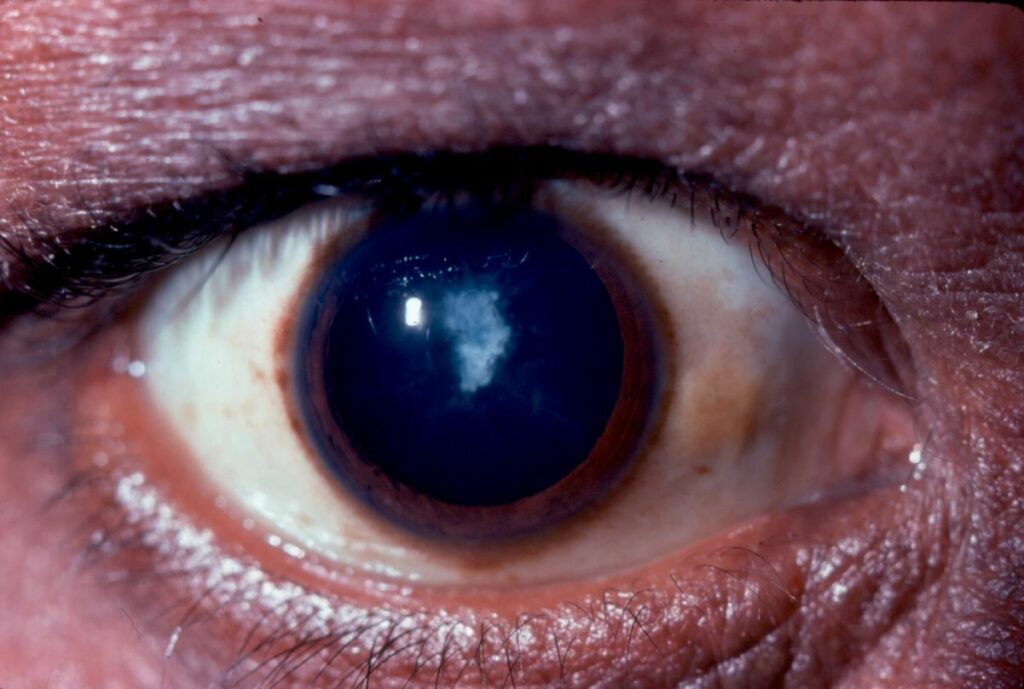An atopic cataract is a type of cataract that is caused by an allergy. It is the most common type of cataract in the world, and it affects millions of people each year. In this blog post, we will discuss the symptoms, causes, and treatment options for atopic cataracts.
Contents
What Is Atopic Cataract?

An atopic cataract is a rare form of cataract that affects the eye. It occurs when the lens in the eye becomes cloudy and causes blurry vision. Atopic cataracts are usually caused by an underlying inflammatory disease, such as atopic dermatitis or allergic conjunctivitis.
In most cases, atopic cataracts can be treated with medication, surgery, or a combination of both. Treatment may vary depending on the severity of the cataract and the underlying cause.
What Are The Symptoms of Atopic Cataract?

Atopic cataracts are usually painless but can cause blurry vision and other vision changes. Symptoms may include:
Blurred or double vision
You may have difficulty seeing objects clearly, or it may look as if two of the same object are overlapping each other.
Difficulty with night vision
You may experience difficulty driving at night due to reduced vision in low light.
Sensitivity to glare and bright light
You may find yourself squinting and avoiding bright lights, especially when you are outside.
Halos around lights
You may see a halo, or a ring of light, surrounding bright objects like car headlights at night.
Change in color perception
You may experience a dulling of colors and difficulty distinguishing between certain shades.
If you experience any of these symptoms, it is important to make an appointment with your doctor or ophthalmologist to discuss the possibility of atopic cataracts. Early diagnosis and treatment can reduce the progression of this eye condition and may even prevent further vision loss.
What Are The Causes of Atopic Cataracts?
There are various causes of atopic cataracts:
1. Genetics: Certain genetic disorders such as Down Syndrome, Marfan Syndrome, and Ehlers-Danlos Syndrome can increase the risk of developing atopic cataracts.
2. Trauma: Injury or trauma to the eye due to some external force can induce atopic cataract formation.
3. Exposure to toxins and chemicals: Prolonged exposure to certain toxins and chemicals such as herbicides, pesticides, solvents, and smoke can cause atopic cataracts.
4. Aging: Age is one of the major risk factors for developing atopic cataracts. As we grow older, our lenses become less flexible, gradually thickening and clouding over.
5. Disease: Diseases such as diabetes, HIV, and some autoimmune disorders can put one at higher risk for developing atopic cataracts.
6. Inheritance: If a parent has an atopic cataract, it increases the likelihood of their children developing the condition as well.
7. Ultra-violet (UV) radiation: Long-term exposure to UV radiation can lead to atopic cataracts. This is why it is important to wear sunglasses and hats with a brim when outdoors to protect your eyes from the sun’s harmful rays.
8. Hormones: Hormonal changes, such as those experienced during menopause, can increase the risk of developing atopic cataracts.
It is important to consult your ophthalmologist regularly to determine if you are at risk for atopic cataracts and to receive treatment as soon as possible. Early detection and treatment can help reduce the chances of needing surgery or other more invasive treatments.
Atopic cataracts can be managed with lifestyle changes as well as medications and surgery, depending on the severity of the condition. If you are worried about your risk for atopic cataracts, speak to an ophthalmologist today. They can help determine if you have any risk factors or inherited syndromes that could lead to atopic cataracts and provide the best treatment options.
What Are The Treatment Options?
There are various treatment options:
Surgery
Depending on the stage of cataract formation and the patient’s preferences, surgery may be recommended. During this procedure, a specially trained ophthalmologist will remove the cloudy lens and replace it with an artificial one. The process is usually straightforward and most people can return home within a few hours after the operation.
Laser Therapy
This is a newer, non-invasive alternative to surgery. A beam of light is used to break up the cataract and allow for better vision without the need for an operation.
Medications
Eye drops or oral medications may be prescribed to slow down the progression of cataracts. If the cataract is not severe, medications may be enough to maintain good vision.
Lifestyle changes
Making healthier lifestyle choices can help slow down or prevent the progression of some types of cataracts. This includes wearing sunglasses when outdoors, avoiding smoking cigarettes, and eating a nutritious diet.
No matter which treatment is chosen, regular eye exams are important to help monitor the cataract and make sure that vision is not affected. Your doctor can provide more information about specific treatment options and what is best for you.
Whenever a cataract is detected, it’s important to speak with a qualified ophthalmologist and create an individualized plan of action. With the right treatment, many people can maintain good vision and continue living life as normal. With the advances in modern medicine, atopic cataracts don’t have to be debilitating conditions.
Prevention Tips
Taking care of your vision is important for preserving healthy eyesight in the long run. By following these prevention tips and consulting with a qualified eye care professional, you can help reduce your risk of developing atopic cataracts. With early detection and proper treatment, you can keep your eyes strong and help avoid further complications.
There are various prevention tips:
- Wear sunglasses to protect the eyes from UV rays.
- Avoid smoking, as it can increase your risk of developing cataracts.
- Eat a healthy diet with plenty of fruits and vegetables. This will help keep the eyes strong and reduce the risk of developing cataracts.
- Maintain regular exercise, as this can help delay the onset of cataracts.
- Take breaks between tasks to give your eyes a rest from straining and focusing on screens. Manage chronic conditions like diabetes, as this can increase the risk of developing atopic cataracts.
- Wear protective eyewear when participating in activities that may pose a risk to the eyes, like sports or working with hazardous materials.
- Always consult your doctor before taking any supplements or medications, as some can increase the risk of developing cataracts.
By taking preventive measures, you can help reduce your risk of developing atopic cataracts. Keeping the eyes healthy and well-protected is key to preserving vision and avoiding complications.
By following these prevention tips and consulting your doctor, you can help reduce your risk of developing atopic cataracts. Taking care of your vision is essential for preserving healthy eyesight in the long run. Keeping the eyes well-protected and healthy is key to reducing the risk of developing cataracts. With early detection and proper preventive measures, atopic cataracts can be avoided. If you have any questions or concerns about your vision, talk to a qualified eye care professional for further advice. They can help make sure that you’re taking the necessary steps to protect and preserve your eyesight.
A regular eye exam can also help detect early signs of cataracts. It’s important to get your eyes checked regularly and to make sure that any vision changes or symptoms are addressed promptly. If an eye exam reveals that you have cataracts, then your doctor may suggest treatments such as surgery or medications to manage the condition.
By monitoring your vision closely and following your doctor’s recommendations, you can help prevent further complications from developing. With proper care and preventive measures, you can reduce your risk of developing atopic cataracts.
Conclusion
It May be concluded that atopic cataract is a condition that can cause vision impairment and should be taken seriously by people affected by it. Prevention is the best strategy for avoiding this condition, so seeking regular eye exams and managing any underlying medical conditions can help minimize the risk of developing atopic cataracts. Treatment options exist to reduce symptoms and improve vision, but these are not always successful in restoring full vision. Therefore, early detection and intervention are important in managing this condition. With the right care, people affected by atopic cataracts can maintain their quality of life despite its effects on vision.
As with any medical condition, it is always advisable to speak to your doctor if you think you may be suffering from an atopic cataract. Your doctor will help you determine the best course of treatment for your case and help protect your vision for years to come.
Cataract surgery is a safe and painless procedure. At MantraCare we have a team of experienced eye surgeons, who will be happy to answer any questions on cataract surgery. Call us at +91-9711116605 for any inquiries.
